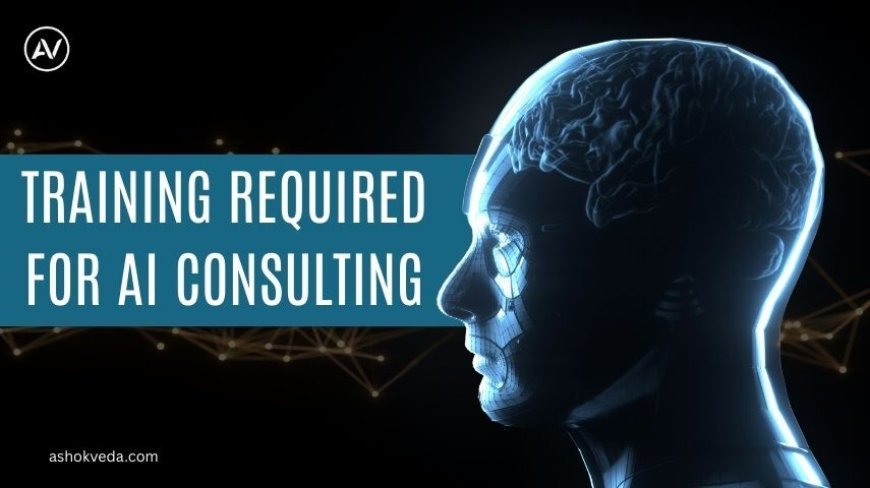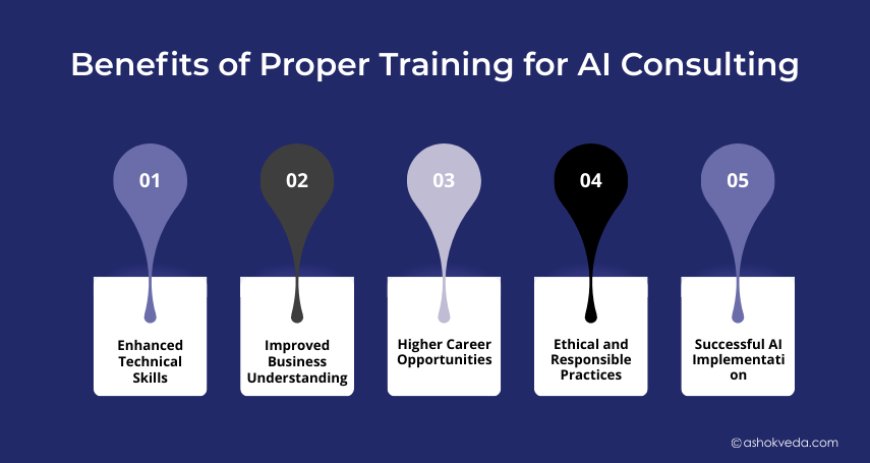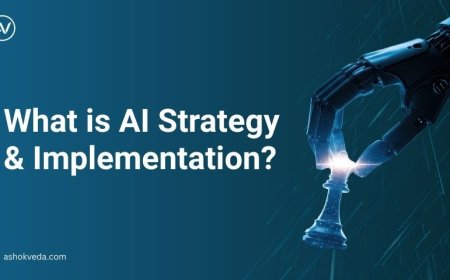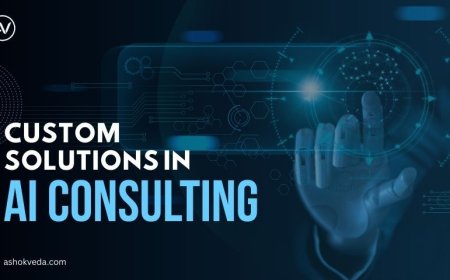Essential Training Required for AI Consulting Success
Explore the comprehensive training required for AI consulting, covering technical skills, business strategy, ethical practices, and practical implementation.

Artificial Intelligence (AI) has emerged as a transformative force across industries, redefining the way businesses operate, make decisions, and engage with customers. According to recent statistics, by 2025, the global AI market is projected to reach $407 billion, with consulting services forming a significant portion of this growth. Companies are increasingly relying on AI consultants to help navigate this complex market, and the training required for AI Consulting has never been more critical.
AI consulting is not just about implementing AI technologies; it’s about understanding business challenges, identifying opportunities for AI integration, and ensuring ethical and effective deployment. As organizations invest heavily in AI, skilled professionals are in high demand to bridge the gap between cutting-edge technology and strategic business solutions.
Understanding the Need for Training in AI Consulting
AI consulting requires a unique combination of technical expertise, business acumen, and strategic thinking. The role of an AI consultant goes beyond coding or building models; it involves advising companies on the best AI strategies, understanding organizational goals, and ensuring that AI implementations align with business objectives.
The training required for AI Consulting ensures that professionals are equipped with the following capabilities:
-
Technical Expertise: Deep understanding of machine learning, natural language processing, computer vision, and predictive analytics.
-
Business Understanding: Ability to align AI strategies with organizational goals and objectives.
-
Ethical Awareness: Knowledge of responsible AI practices and regulatory compliance.
-
Communication Skills: Ability to convey complex AI concepts to non-technical stakeholders.
With AI adoption growing swiftly across sectors like healthcare, finance, retail, and manufacturing, consultants must stay ahead of the curve. Training helps in mastering emerging technologies, understanding industry-specific use cases, and developing frameworks for successful AI deployment.
Core Components of AI Consulting Training
A comprehensive training program for AI consulting should cover multiple areas to ensure well-rounded expertise. Here are the key components:
1. Technical Proficiency
Technical proficiency forms the backbone of AI consulting. Professionals must be skilled in:
-
Machine Learning Algorithms: Supervised, unsupervised, and reinforcement learning models.
-
Data Analytics: Understanding data preprocessing, feature engineering, and exploratory data analysis.
-
Programming Languages: Python, R, SQL, and other relevant programming languages.
-
AI Tools and Frameworks: TensorFlow, PyTorch, Scikit-learn, Keras, and OpenAI tools.
Training in these areas ensures that consultants can develop, evaluate, and implement AI models effectively.
2. Business Strategy and Problem-Solving
AI solutions must solve real-world business problems. Training should focus on:
-
Business Process Understanding: Identifying areas where AI can optimize processes.
-
ROI Analysis: Evaluating the potential return on AI investments.
-
Decision-Making Frameworks: Integrating AI recommendations into strategic business decisions.
3. Ethics and Regulatory Compliance
Ethical considerations are crucial in AI consulting. Training should cover:
-
Bias Detection and Mitigation: Ensuring fairness in AI algorithms.
-
Data Privacy and Security: Compliance with regulations like GDPR and HIPAA.
-
Responsible AI Practices: Guidelines for ethical AI deployment in organizations.
4. Soft Skills for Consulting
Consulting is as much about people as it is about technology. AI consultants must excel in:
-
Communication: Translating technical AI concepts into business language.
-
Stakeholder Management: Collaborating with teams across departments.
-
Problem-Solving: Creative approaches to complex business challenges.
5. Hands-on Projects and Case Studies
Practical experience is vital for AI consultants. Training programs should include:
-
Real-World Case Studies: Industry-specific AI implementation scenarios.
-
Capstone Projects: End-to-end AI project development from data collection to deployment.
-
Simulations: Problem-solving exercises to reinforce learning.
Essential Skills Covered in AI Consulting Training
The training required for AI Consulting equips professionals with a variety of skills, such as:
1. Data Management and Analysis
AI consulting starts with data. Training includes data collection, cleaning, preprocessing, and analysis. Consultants must understand how to:
-
Extract actionable insights from raw data.
-
Identify data quality issues and implement solutions.
-
Use data visualization tools to communicate findings.
2. AI Model Development and Evaluation
Developing AI models is core to consulting. Training focuses on:
-
Building machine learning and deep learning models.
-
Evaluating model performance using metrics like accuracy, precision, recall, and F1-score.
-
Optimizing models for scalability and real-world deployment.
3. AI Deployment and Integration
Implementation is where theory meets practice. Training covers:
-
Integrating AI solutions with existing IT systems.
-
Ensuring models function efficiently in production environments.
-
Using cloud platforms like AWS, Azure, and Google Cloud for AI deployment.
4. Industry-Specific Knowledge
Different sectors require tailored AI solutions. Training includes:
-
Healthcare AI applications like predictive diagnostics and patient monitoring.
-
Finance AI for fraud detection and algorithmic trading.
-
Retail AI for recommendation engines and customer personalization.
5. Continuous Learning and Adaptability
AI is an evolving field. Consultants must be trained to:
-
Keep up with emerging technologies and research papers.
-
Adopt new frameworks and tools quickly.
-
Encourage a culture of continuous learning within organizations.
Training Formats for AI Consulting
The training required for AI Consulting can be delivered through various formats, depending on learning preferences and objectives:
-
Online Courses and Certifications: Accessible, flexible, and often industry-recognized.
-
Bootcamps and Workshops: Intensive, hands-on programs focused on practical skills.
-
University Programs: Comprehensive courses covering AI, data science, and business strategy.
-
Corporate Training: Customized programs tailored for company-specific AI needs.
-
Mentorship and Peer Learning: Learning from experienced AI consultants through guided projects.
Benefits of Proper Training for AI Consulting
Investing in training yields significant benefits for both professionals and organizations:
-
Enhanced Technical Skills: Stronger proficiency in AI tools and frameworks.
-
Improved Business Understanding: Ability to align AI strategies with organizational goals.
-
Higher Career Opportunities: Competitive advantage in AI consulting roles.
-
Ethical and Responsible Practices: Awareness of biases, privacy, and compliance.
-
Successful AI Implementation: Reduced project failures and improved ROI.

Challenges in AI Consulting Training
While the benefits are clear, training for AI consulting comes with challenges:
-
Rapid Technological Advancements: AI tools and frameworks evolve quickly, making it challenging for training programs to stay up-to-date.
-
Diverse Skill Requirements: Consultants need a combination of technical expertise, business understanding, and problem-solving skills.
-
Limited Practical Exposure: Theoretical knowledge alone is insufficient; hands-on experience with real-world data and projects is crucial.
-
Resource Constraints: Time, cost, and access to quality datasets can restrict effective training.
-
Ethical and Regulatory Complexity: Understanding responsible AI practices, bias mitigation, and compliance adds an extra layer of difficulty.
-
Customization of Training: Different industries and organizations require tailored approaches, making standardized training less effective.
-
Integration Challenges: Learning how AI fits into existing business processes can be complex for newcomers.
The training required for AI Consulting is multifaceted, combining technical skills, business acumen, ethical awareness, and soft skills. With the AI market growing exponentially, professionals who invest in comprehensive training are better equipped to provide strategic insights, implement effective solutions, and drive organizational growth. As AI continues to shape industries worldwide, well-trained consultants will play a critical role in ensuring that AI initiatives are not only technologically advanced but also ethically responsible and strategically aligned. Businesses that prioritize proper training for their AI consultants will undoubtedly gain a competitive edge, harnessing the full potential of AI while mitigating risks.





































